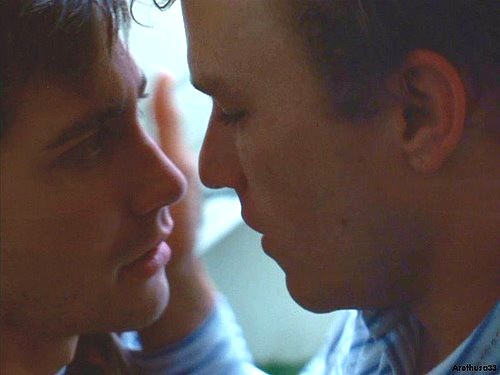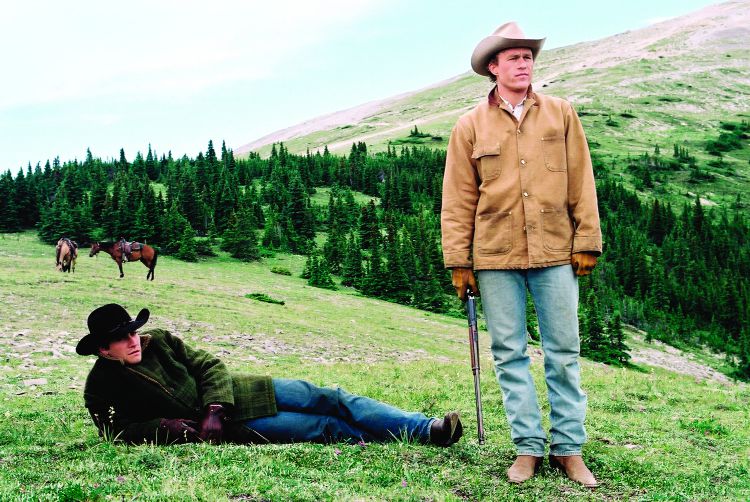Brokeback Mountain (2005)
CAST: Heath Ledger, Jake Gyllenhaal, Michelle Williams, Anne Hathaway, Randy Quaid
REVIEW:
While the comparison might not occur to everyone, Brokeback Mountain (adapted from a 1997 short story of the same name by Annie Proulx, with the movie screenplay written by Diana Ossana and Larry McMurtry) is a spiritual cousin to such films as Witness, Bridges of Madison County, and The Remains of the Day. All four films, while depicting characters living very different lives in different times and places, are at their core about the longing between two people who are unable or unwilling to bridge the gulf that separates them. Obviously, the distinguishing factor setting Brokeback Mountain apart is that its forbidden love affair, unlike the above films, is between two men, and while the homosexual aspect will make some viewers uncomfortable, to pigeonhole it as a “gay cowboy movie”, as some have dismissively done, is a disservice and an oversimplification. The complexity of the characters’ dynamics defy such easy labels.
Brokeback Mountain spans approximately twenty years, but it begins in the summer of 1963 when two young men, taciturn introvert Ennis Del Mar (Heath Ledger) and the more outgoing Jack Twist (Jake Gyllenhaal) meet and work together for rancher Joe Aguirre (Randy Quaid) herding his sheep on Wyoming’s Brokeback Mountain. Gradually, a tentative friendship forms between them, despite Ennis’ reticence. And then, one fateful night as the two shelter together inside the tent during a storm, one thing leads to another and, abruptly and almost violently, they have sex. Afterward, despite both insisting (not entirely convincingly) that they’re not gay, and Ennis’ declaration that it was a one-time incident, the two fall into a forbidden love affair. But their relationship comes with a ticking countdown, and at summer’s end, they return to civilization and go their separate ways, Ennis marrying his longtime fiancee Alma (Michelle Williams), and Jack finding work as a rodeo cowboy and marrying socialite Lureen (Anne Hathaway) when she gets pregnant from a one-night stand. Four years pass, but despite their seemingly conventional lives as married men, neither is able to erase the other from his thoughts, and when Jack pays a visit, they quickly pick up where they left off.
For Taiwan native Ang Lee, this is another “and now for something completely different” entry on a filmography that already includes such diverse titles as the Jane Austen adaptation Sense and Sensibility, the martial arts extravaganza Crouching Tiger, Hidden Dragon, the searing ’70s drama The Ice Storm, the superhero flick Hulk, and the Civil War drama Ride With The Devil. Lee shows a strong sense of place and characterization. The movie is handsomely-filmed, with picturesque landscape shots of Brokeback Mountain, and while its slow burn pace will be considered sluggish by some viewers, the characters are strongly-defined. Even Jack’s parents (Roberta Maxwell and Peter McRobbie), whom we only see in one scene, are distinct individuals. Several scenes, perhaps most notably a phone conversation between Ennis and Lureen, and the scene in which Ennis meets Jack’s parents, are fascinating in what is said and what goes unsaid, and the fate of one character is deliberately left ambiguous, with different viewers interpreting the onscreen evidence in different ways. In fact, one could argue the supporting characters are so strong—especially Alma—-that at times it’s slightly frustrating the movie only shows us snapshots of their lives, dropping in at key moments over the two decades, a sort of “greatest hits” montage showing the deterioration of both men’s marriages and their own turbulent relationship. Perhaps the most crucial, and arguably most difficult, thing that Lee and his actors accomplish is that, like the sexual tension between Harrison Ford and Kelly McGillis in Witness, the longing is a palpable presence that hangs thick in the air. We can feel it, which goes a long way toward buying the central premise.
 The performances, as is essential for this kind of heavy character-based drama, are solid, with Heath Ledger, Jake Gyllenhaal, and Michelle Williams all receiving deserved Oscar nominations for their work here. For Heath Ledger, this was a break away from the “heartthrob” image he had attained from earlier lightweight parts like the teen romantic comedy 10 Things I Hate About You and into far meatier dramatic material (reportedly Ledger disliked being pegged with the “heartthrob” label and sought to be taken more seriously as an actor), and he shows a depth and the makings of a character actor he had not previously gotten the chance to display. There is nothing overtly or stereotypically “gay” about Ennis; he’s a good old boy “man’s man” who is tormented by his inability to resist his secret desires (it’s worth noting Jack is the only man Ennis displays attraction to, while apart from his fling with Lureen that results in an unexpected pregnancy and an ill-advised marriage, Jack seems more overtly homosexual, or at least more comfortable acting on it). Ennis is a tricky role, who must convey pain and loneliness behind a stoic, tight-lipped demeanor, and Ledger sinks beneath his character’s skin. Ledger speaks more with his body language—his hunched posture, hangdog, clench-jawed expression, and slow gait—than his terse words, which seemingly have to be dragged out of him with a pair of pliers. Ennis never looks comfortable, and the closer he gets to Jack, the more uncomfortable he gets. By contrast to the glumly repressed Ennis, Jake Gyllenhaal’s Jack is a little more self-accepting, a little more at home in his own skin. While Ennis is all clench-jawed brooding, Jack’s face is smooth and open, his eyes deep pools of earnestness and yearning. It’s Jack who tries to show tenderness and affection, which Ennis is reticent about accepting or responding to, and it’s Jack who wants them to abandon their unsatisfying lives and sham marriages and live together. Ennis, terrified of exposure and so deeply closeted he may well never admit he’s gay even to himself despite a twenty year on-again off-again affair with another man, finds this unthinkable (motivated in large part by his own homophobic father forcing him as a child to witness the brutal lynching of two gay men, which leaves a lifelong impression on him). Like Witness’ John Book and Rachael Lapp, Ennis and Jack steal the occasional interlude, but they can never have a full life together. Michelle Williams is equally strong, despite having more limited screentime. Alma is arguably the movie’s most tragic character, a woman who finds herself blindsided by a situation people in a 1960s Wyoming small town don’t talk about, which she is not prepared to even comprehend, let alone know how to deal with. Her expression when she inadvertently spies on her husband in a passionate embrace with another man speaks more than any dialogue could have done. Anne Hathaway, who like Ledger seized on this as an opportunity to break into more serious acting, plays Lureen with the right mix of sass and artificiality (and sheds her wholesome Disney princess image by displaying nudity), though she’s not given as much opportunity as Williams to stand out. And Randy Quaid gets a straight role (no pun intended) as Ennis and Jack’s first boss Aguirre, who doesn’t look kindly on what he eventually realizes about how they’re spending their free time. There are small roles for David Harbour (as a married rancher who may take a more than friendly interest in Jack), Anna Faris (as his wife), Linda Cardellini (as a girlfriend of Ennis), and Kate Mara (as Ennis’ grown daughter).
The performances, as is essential for this kind of heavy character-based drama, are solid, with Heath Ledger, Jake Gyllenhaal, and Michelle Williams all receiving deserved Oscar nominations for their work here. For Heath Ledger, this was a break away from the “heartthrob” image he had attained from earlier lightweight parts like the teen romantic comedy 10 Things I Hate About You and into far meatier dramatic material (reportedly Ledger disliked being pegged with the “heartthrob” label and sought to be taken more seriously as an actor), and he shows a depth and the makings of a character actor he had not previously gotten the chance to display. There is nothing overtly or stereotypically “gay” about Ennis; he’s a good old boy “man’s man” who is tormented by his inability to resist his secret desires (it’s worth noting Jack is the only man Ennis displays attraction to, while apart from his fling with Lureen that results in an unexpected pregnancy and an ill-advised marriage, Jack seems more overtly homosexual, or at least more comfortable acting on it). Ennis is a tricky role, who must convey pain and loneliness behind a stoic, tight-lipped demeanor, and Ledger sinks beneath his character’s skin. Ledger speaks more with his body language—his hunched posture, hangdog, clench-jawed expression, and slow gait—than his terse words, which seemingly have to be dragged out of him with a pair of pliers. Ennis never looks comfortable, and the closer he gets to Jack, the more uncomfortable he gets. By contrast to the glumly repressed Ennis, Jake Gyllenhaal’s Jack is a little more self-accepting, a little more at home in his own skin. While Ennis is all clench-jawed brooding, Jack’s face is smooth and open, his eyes deep pools of earnestness and yearning. It’s Jack who tries to show tenderness and affection, which Ennis is reticent about accepting or responding to, and it’s Jack who wants them to abandon their unsatisfying lives and sham marriages and live together. Ennis, terrified of exposure and so deeply closeted he may well never admit he’s gay even to himself despite a twenty year on-again off-again affair with another man, finds this unthinkable (motivated in large part by his own homophobic father forcing him as a child to witness the brutal lynching of two gay men, which leaves a lifelong impression on him). Like Witness’ John Book and Rachael Lapp, Ennis and Jack steal the occasional interlude, but they can never have a full life together. Michelle Williams is equally strong, despite having more limited screentime. Alma is arguably the movie’s most tragic character, a woman who finds herself blindsided by a situation people in a 1960s Wyoming small town don’t talk about, which she is not prepared to even comprehend, let alone know how to deal with. Her expression when she inadvertently spies on her husband in a passionate embrace with another man speaks more than any dialogue could have done. Anne Hathaway, who like Ledger seized on this as an opportunity to break into more serious acting, plays Lureen with the right mix of sass and artificiality (and sheds her wholesome Disney princess image by displaying nudity), though she’s not given as much opportunity as Williams to stand out. And Randy Quaid gets a straight role (no pun intended) as Ennis and Jack’s first boss Aguirre, who doesn’t look kindly on what he eventually realizes about how they’re spending their free time. There are small roles for David Harbour (as a married rancher who may take a more than friendly interest in Jack), Anna Faris (as his wife), Linda Cardellini (as a girlfriend of Ennis), and Kate Mara (as Ennis’ grown daughter).
The conclusion of Brokeback Mountain is downbeat and tearjerking, but like the rest of the film, things stay subdued and restrained, and Lee resists the temptation to make things more melodramatic. The movie won’t be everyone’s cup of tea, but for those who are not bothered by the homosexual aspects, it offers a study in yearning, love, and loss that evokes some of the same emotions as The Remains of the Day. The characters and their situations are richly-drawn and well-developed, and contain far more depth and complexity than the dismissively simplistic label of a “gay cowboy movie” gives credit for. It’s another respectable entry on Ang Lee’s eclectic filmography.
* * * 1/2
